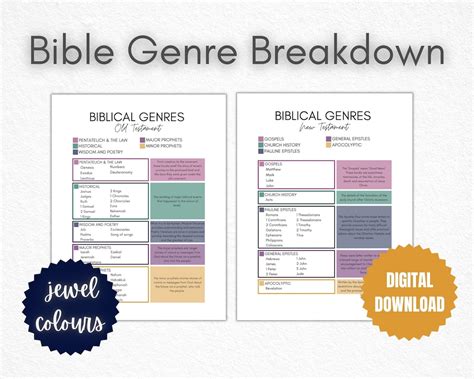Effective Bible Study: A Genre-by-Genre Approach
The Bible isn't a single, monolithic book; it's a library of diverse literary genres, each demanding a unique approach to interpretation. Understanding the genre of a particular passage is crucial for effective Bible study. Failing to do so can lead to misinterpretations and a skewed understanding of God's word. This article will explore effective Bible study techniques, focusing on a genre-by-genre approach to unlock the richness and depth of Scripture.
Understanding Different Bible Genres
Before diving into specific genres, it's vital to recognize the overarching diversity within the Bible. We aren't just reading historical accounts; we're encountering poetry, law, prophecy, parables, letters, and more. Each genre employs distinct literary devices and aims to communicate differently. Neglecting these distinctions leads to flawed interpretations.
Genre-Specific Bible Study Techniques
1. Narrative (e.g., Genesis, Gospels):
Narratives tell stories. Effective study involves:
- Identifying the plot: What are the main events? Who are the key characters? What is the conflict? How is it resolved?
- Analyzing characters: What are their motivations? How do they interact with each other and with God?
- Understanding the setting: What is the historical and cultural context? How does this shape the story?
- Discerning the author's intent: What message is the author trying to convey through the story? What are the theological implications?
2. Poetry (e.g., Psalms, Proverbs):
Poetry relies on imagery, metaphors, and symbolism. Studying poetry requires:
- Focusing on imagery and symbolism: What images are used? What do they represent? How do they contribute to the overall meaning?
- Paying attention to literary devices: Identify metaphors, similes, parallelism, and other poetic techniques. How do these devices enhance the meaning and emotional impact of the text?
- Considering the context: Who wrote the poem? What were the circumstances surrounding its composition? How does this shape its interpretation?
- Recognizing the emotional tone: What emotions are expressed in the poem? How does the poem evoke these emotions in the reader?
3. Law (e.g., Exodus, Leviticus):
The Law provides commandments and regulations. Understanding the law requires:
- Understanding the historical context: When and why were these laws given? To whom did they apply?
- Distinguishing between ceremonial, civil, and moral laws: What is the purpose of each type of law? How do they relate to each other? Which laws are still applicable today? (This requires careful consideration and theological reflection.)
- Considering the principles behind the laws: What underlying principles or values are these laws designed to uphold?
- Applying the principles to modern life: How can the principles behind the laws guide our actions today?
4. Prophecy (e.g., Isaiah, Revelation):
Prophecy often involves predicting future events, but also includes judgment, exhortation, and comfort. Studying prophecy requires:
- Understanding the historical context: Who was the prophet? To whom were they speaking? What were the historical circumstances?
- Distinguishing between predictive and prescriptive prophecy: What prophecies refer to specific future events, and which offer guidance for life?
- Interpreting symbolic language: Prophecy often uses symbolic language and imagery. Careful consideration of the context is essential for interpretation.
- Avoiding premature or simplistic interpretations: Many prophecies have multiple layers of meaning that unfold over time.
5. Gospels (e.g., Matthew, Mark, Luke, John):
The Gospels tell the story of Jesus' life, ministry, death, and resurrection. Studying the Gospels involves:
- Comparing the Gospels: Each Gospel presents Jesus' life from a unique perspective. Comparing and contrasting the accounts enriches understanding.
- Identifying key themes: What are the major themes emphasized in each Gospel? (e.g., Matthew emphasizes Jesus as King, John emphasizes Jesus as the Son of God).
- Analyzing Jesus' teachings: What are the key teachings of Jesus? How do they apply to our lives?
- Understanding the historical context: What was the historical and cultural situation during Jesus' ministry?
6. Epistles (e.g., Romans, Corinthians):
The Epistles are letters written by Paul and other apostles to early Christian churches. Studying the Epistles requires:
- Understanding the audience: To whom was the letter written? What were their circumstances?
- Identifying the main theme or purpose: What is the central message of the letter?
- Analyzing the argument: How does the author develop their argument? What are the key points?
- Applying the principles to contemporary life: How can the principles discussed in the letter guide our lives today?
How to Approach Bible Study Effectively
Regardless of genre, effective Bible study involves:
- Prayerful Approach: Begin with prayer, seeking God's guidance and illumination.
- Contextual Understanding: Understand the historical, cultural, and literary context.
- Careful Observation: Pay close attention to the details of the text.
- Interpretation: Interpret the text in light of its context and the overall message of Scripture.
- Application: Apply the principles you learn to your own life.
By adopting a genre-aware approach, you can move beyond superficial readings and engage with the Bible in a deeper, more meaningful way, unlocking its timeless wisdom and transforming power. Remember, this is a journey, not a destination; consistent and thoughtful engagement is key to growing in your understanding of God's Word.

